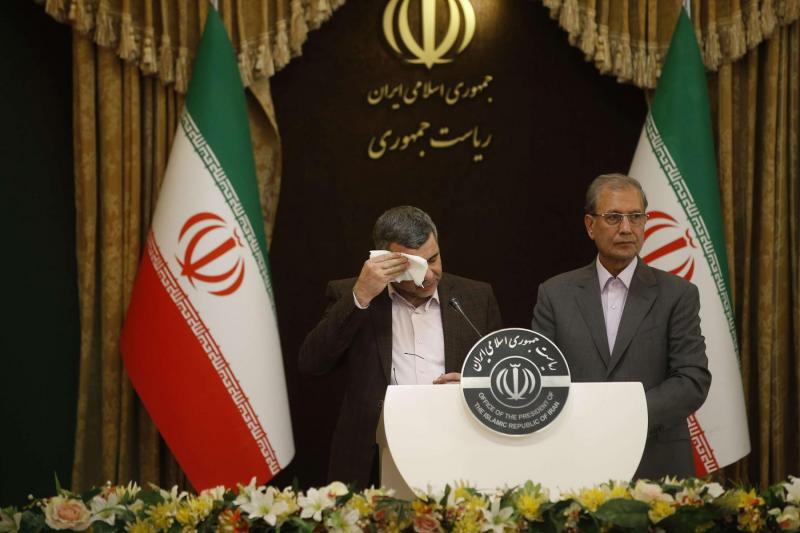Plague-ridden Islamic Republic takes wrong decisions, again
The unusual events described in this chronicle revolve around the arrival of the coronavirus in Iran and the Islamic Republic’s reactions to it. None of this was inevitable but, at each instance, regime officials prioritised goals other than securing the public health.
Since the outbreak of the coronavirus in China, Iranian media debated the risk of passengers flying into Iran from China acting as carriers of the virus but, diplomatically isolated and increasingly dependent on Beijing for its economic survival, Tehran did not dare antagonise China by stopping direct flights. Passengers from China disembarking at airports in Iran have their temperature checked but this method is inadequate because of the 2-week incubation period of the virus.
Before long, the coronavirus surfaced in Iran and, on February 19, the Iranian Health Ministry reported the death of two patients in Qom, south of Tehran. Two other patients from Qom and one from Arak were identified on February 20. The next day, which marked the parliamentary election in Iran, 13 people, seven from Qom, were diagnosed with coronavirus. By February 22, ten more cases were reported, bringing the total to 29.
In his first public comments on the virus, February 23, Iranian Supreme Leader Ayatollah Ali Khamenei seemed to care more about the scandalously low voter turnout than the epidemic.
In an attempt to explain the meagre 42% turnout, the lowest parliamentary election participation in the history of the Islamic Republic, Khamenei said: “This illness came handy [for the opponents of the regime]. The night before the election, the [enemy] began its propaganda by saying: ‘Don’t ever get in the line to vote… such and such danger threatens you. There is illness, sickness and virus!’ But Qom, the alleged centre of the epidemic, had the busiest ballots!”
Since those statements, Khamenei has cancelled meetings and gone into occultation out of fear of the virus. The Assembly of Experts, which elects the leader, postponed its session. There were reports of high-ranking clerics fleeing Qom.
The government could — theoretically — impose a quarantine on Qom, the epicentre of the coronavirus in Iran but Iranian President Hassan Rohani clearly does not want to pick a fight against Iran’s Vatican and clergy.
Regime authorities, on the other hand, energetically if not always convincingly, try to calm the public. A tragic example is Dr Iraj Harirchi, deputy health minister in charge of the government’s effort to contain the coronavirus.
On February 24, the coughing and sweating Harirchi appeared at a news conference to contest parliamentarian Ahmad Amir-Abadi Farahani’s claims that coronavirus had claimed 50 lives in Qom.
“If the number of fatalities of the virus in Qom is half or even a quarter of this number, I will resign,” Harirchi said, asking Farahani to produce a list of those who had died because of the virus. The official numbers, Harirchi insisted, was “between 59 to 61 infected people and 12 fatalities.”
The next day, Farahani said he submitted the names of 40 people who had died of coronavirus in Qom and demanded Harirchi’s resignation. The hapless Harirchi responded by releasing a video admitting he himself was infected.
The numbers keep rising. The Health Ministry reported 388 infected and 34 fatalities. The Tehran Health Committee director said he believes the real number of the infected may be 10,000-15,000.
Khamenei delievered a televised address on February 27, thanking the efforts of Iran’s nurses and doctors but the regime in its entirety prioritises strategic relations with China over concerns about the spread of the virus. Khamenei prioritises election voter turnout over the spread of the coronavirus at the ballot. Rohani prioritises his relations with the clergy in Qom over imposing quarantine to protect the citizenry and health officials are the symbols of a sick political system.
Most Iranians infected with the virus will, hopefully, recover and survive but the plague-ridden Islamic Republic itself appears chronically, if not terminally, ill.
Ali Alfoneh is a non-resident senior fellow at Rafik Hariri Centre for the Middle East at the Atlantic Council.
This article was originally published in The Arab Weekly.







